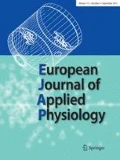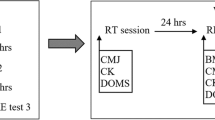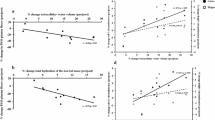Abstract
This study examined the combined effect of exercise induced hyperthermia and dehydration on neuromuscular function in human subjects. Six trained male runners ran for 40 min on a treadmill at 65% of their maximal aerobic velocity while wearing a tracksuit covered with an impermeable jacket and pants to impair the evaporation of sweat. These stressful experimental running conditions led the runners to a physiological status close to exhaustion. On average, the 40 min run ended at a heart rate of 196 (SD 8) beats · min−1, a tympanic temperature of 40 (SD 0.3) °C and with a loss of body mass of 2 (SD 0.5)%. Pre- and post-running strength tests included measurements of maximal knee extension and flexion torques in both isometric and isokinetic (at 60 and 240° · s−1) conditions. A 20 s endurance test at 240° · s−1 was also performed. Surface electromyographic (EMG) activity was recorded from six knee extensor and flexor muscles during the entire protocol. The treadmill run led to clear decrements in maximal extension torque and EMG activity both in isometric and at the slowest isokinetic velocity (60° · s−1). However, no differences in these parameters were observed at 240° · s−1. Furthermore, the EMG patterns of the major knee extensor and flexor muscles remained remarkably stable during the treadmill run. These results demonstrate that the exercise-induced hyperthermia and dehydration in the present experiments had only minor effects on the neuromuscular performance. However, it is also suggested that high internal body temperature per se could limit the production of high force levels.
Similar content being viewed by others
Author information
Authors and Affiliations
Additional information
Accepted: 26 September 2000
Rights and permissions
About this article
Cite this article
Ftaiti, F., Grélot, L., Coudreuse, J. et al. Combined effect of heat stress, dehydration and exercise on neuromuscular function in humans. Eur J Appl Physiol 84, 87–94 (2001). https://doi.org/10.1007/s004210000339
Issue Date:
DOI: https://doi.org/10.1007/s004210000339




